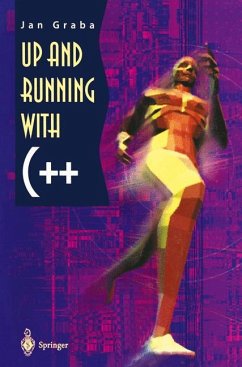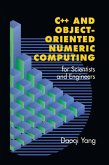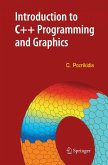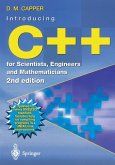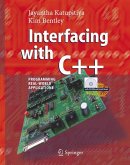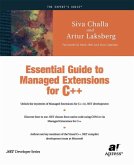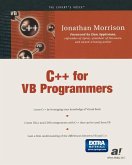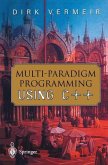Jan Graba
Up and Running with C++
Jan Graba
Up and Running with C++
- Broschiertes Buch
- Merkliste
- Auf die Merkliste
- Bewerten Bewerten
- Teilen
- Produkt teilen
- Produkterinnerung
- Produkterinnerung
Up and Running with C++ provides the reader with a quick guide to the fundamental concepts of object orientation and the implementation of those concepts in the C++ programming language. No prior knowledge of either C or C++ is assumed on the part of the reader, though it is assumed that the reader will be familiar with the basic programming concepts of sequence, selection and iteration. Starting from this rudimentary base, the reader is introduced to C++ programming features in a manner which avoids overly technical detail and which builds up his/her knowledge of C++ in a systematic and…mehr
Andere Kunden interessierten sich auch für
![C++ and Object-Oriented Numeric Computing for Scientists and Engineers C++ and Object-Oriented Numeric Computing for Scientists and Engineers]() Daoqi YangC++ and Object-Oriented Numeric Computing for Scientists and Engineers67,99 €
Daoqi YangC++ and Object-Oriented Numeric Computing for Scientists and Engineers67,99 €![Introduction to C++ Programming and Graphics Introduction to C++ Programming and Graphics]() Constantine PozrikidisIntroduction to C++ Programming and Graphics38,99 €
Constantine PozrikidisIntroduction to C++ Programming and Graphics38,99 €![Introducing C++ for Scientists, Engineers and Mathematicians Introducing C++ for Scientists, Engineers and Mathematicians]() Derek CapperIntroducing C++ for Scientists, Engineers and Mathematicians54,99 €
Derek CapperIntroducing C++ for Scientists, Engineers and Mathematicians54,99 €![Interfacing with C++ Interfacing with C++]() Jayantha KatupitiyaInterfacing with C++38,99 €
Jayantha KatupitiyaInterfacing with C++38,99 €![Essential Guide to Managed Extensions for C++ Essential Guide to Managed Extensions for C++]() Artur LaksbergEssential Guide to Managed Extensions for C++28,99 €
Artur LaksbergEssential Guide to Managed Extensions for C++28,99 €![C++ for VB Programmers C++ for VB Programmers]() Jonathan MorrisonC++ for VB Programmers39,99 €
Jonathan MorrisonC++ for VB Programmers39,99 €![Multi-Paradigm Programming using C++ Multi-Paradigm Programming using C++]() Dirk VermeirMulti-Paradigm Programming using C++75,99 €
Dirk VermeirMulti-Paradigm Programming using C++75,99 €-
-
-
Up and Running with C++ provides the reader with a quick guide to the fundamental concepts of object orientation and the implementation of those concepts in the C++ programming language. No prior knowledge of either C or C++ is assumed on the part of the reader, though it is assumed that the reader will be familiar with the basic programming concepts of sequence, selection and iteration. Starting from this rudimentary base, the reader is introduced to C++ programming features in a manner which avoids overly technical detail and which builds up his/her knowledge of C++ in a systematic and cohesive manner. Throughout the book, examples are used to illustrate the material and each chapter contains a series of programming exercises, with full working solutions provided at the end of the book. A very reader-friendly text introducing C++ and the basics of object orientation, this book will be a valuable guide for students and practitioners alike.
Produktdetails
- Produktdetails
- Verlag: Springer / Springer, Berlin / Springer, London
- 1998.
- Seitenzahl: 316
- Erscheinungstermin: 18. März 1998
- Englisch
- Abmessung: 235mm x 155mm x 18mm
- Gewicht: 492g
- ISBN-13: 9783540762348
- ISBN-10: 3540762345
- Artikelnr.: 26520811
- Herstellerkennzeichnung
- Springer-Verlag GmbH
- Tiergartenstr. 17
- 69121 Heidelberg
- ProductSafety@springernature.com
- Verlag: Springer / Springer, Berlin / Springer, London
- 1998.
- Seitenzahl: 316
- Erscheinungstermin: 18. März 1998
- Englisch
- Abmessung: 235mm x 155mm x 18mm
- Gewicht: 492g
- ISBN-13: 9783540762348
- ISBN-10: 3540762345
- Artikelnr.: 26520811
- Herstellerkennzeichnung
- Springer-Verlag GmbH
- Tiergartenstr. 17
- 69121 Heidelberg
- ProductSafety@springernature.com
1 The Fundamentals of Object Orientation.- 1.1 Brief Background.- 1.2 Basic Concepts and Terminology.- 1.3 The Motivation for a New Approach.- 1.4 Why OOP?.- 1.5 The Next Few Chapters.- 2 First Steps in C++ Programming.- 2.1 The Basic Structure of a C++ Program.- 2.2 Basic Data Types and Variable Declarations.- 2.3 Type Conversions.- 2.4 Constants.- 2.5 Standard Input and Formatted Output.- 2.6 Enumerated Types.- 2.7 The Scope of a Variable.- 2.8 The Lifetime of a Variable.- 2.9 Common Operators.- Exercises.- 3 Selections and Iterations.- 3.1 The Relational Operators.- 3.2 Selection Statements.- 3.3 Iterations.- 3.4 The Use of break and continue.- 3.5 The Logical Operators.- Exercises.- 4 Functions and Header Files.- 4.1 Functions.- 4.2 Linkage 34.- 4.3 Non-System Header Files.- 4.4 The Multiple Inclusion Problem.- 4.5 Function Overloading.- 4.6 Default Arguments.- Exercises.- 5 Arrays, Pointers and References.- 5.1 Structured Types.- 5.2 Array Declaration and Usage.- 5.3 Array Initialisation.- 5.4 Array Processing.- 5.5 Strings.- 5.6 Pointers.- 5.7 Pointers and Arguments.- 5.8 Arrays and Pointers.- 5.9 The NULL Pointer.- 5.10 Strings Revisited.- 5.11 Functions for String Processing.- 5.12 Memory Allocation for Strings.- 5.13 Reference Types.- 5.14 References as Arguments.- Exercises.- 6 Adding Sophistication to Basic I/O.- 6.1 Handling 'Whitespace' in Text Input.- 6.2 The Formatting of Output Via Manipulators.- Exercises.- 7 Classes in C++.- 7.1 Structures.- 7.2 Explicit Class Declarations.- 7.3 Access Control.- 7.4 Member Function Definitions.- 7.5 Using a Class.- 7.6 Inline Member Functions.- 7.7 Constructors.- 7.8 Destructors.- 7.9 Arrays of Objects.- 7.10 Objects Within Objects.- 7.11 The this Pointer.- 7.12 Static Class Members.- Exercises.- 8 Dynamic MemoryManagement.- 8.1 Introduction.- 8.2 new and delete.- 8.3 Dynamic Memory Usage with Classes.- 8.4 Dynamic Data Structures.- 8.5 Dynamic Arrays of Objects.- 8.6 Dynamic Instance Variables.- Exercises.- 9 Inheritance.- 9.1 Inheritance in the Context of Object Orientation.- 9.2 Inheritance in C++.- 9.3 Designing a Class Hierarchy.- Exercises.- 10 Polymorphism.- 10.1 Polymorphism in the Context of Object Orientation.- 10.2 The Assignment Compatibility Rule Revisited.- 10.3 Function Binding.- 10.4 Virtual Functions.- 10.5 Constructors and Destructors.- 10.6 Pure Virtual Functions and Abstract Base Classes.- 10.7 Heterogeneous Linked Lists.- Exercises.- 11 Friend Functions and Operator Functions.- 11.1 Access Problems.- 11.2 Friend Functions.- 11.3 Operator Functions and Operator Overloading.- Exercises.- 12 File Handling.- 12.1 File Streams.- 12.2 Opening and Closing Files.- 12.3 Writing and Reading Lines To/From a Text File.- 12.4 Character-Level I/O.- 12.5 cin and cout as Files.- 12.6 Using Command Line Parameters.- 12.7 Random Access.- Exercises.- 13 Templates.- 13.1 Introduction.- 13.2 Template Functions ('Generic Functions').- 13.3 Parameterised Types ('Generic Types').- Exercises.- Appendix A Exception Handling.- Appendix B Platform Variations.- B.1 Borland C++.- B. 1.1 Creating and Running a Program.- B.1.2 Single-key Input.- B.1.3 Screen-Handling.- B.2 Unix Implementations.- B.2.1 Compiling and Running a Program.- B.2.2 Unix Screen-Handling.- Appendix C Stream Formatting.- Model Solutions to Programming Exercises.
1 The Fundamentals of Object Orientation.- 1.1 Brief Background.- 1.2 Basic Concepts and Terminology.- 1.3 The Motivation for a New Approach.- 1.4 Why OOP?.- 1.5 The Next Few Chapters.- 2 First Steps in C++ Programming.- 2.1 The Basic Structure of a C++ Program.- 2.2 Basic Data Types and Variable Declarations.- 2.3 Type Conversions.- 2.4 Constants.- 2.5 Standard Input and Formatted Output.- 2.6 Enumerated Types.- 2.7 The Scope of a Variable.- 2.8 The Lifetime of a Variable.- 2.9 Common Operators.- Exercises.- 3 Selections and Iterations.- 3.1 The Relational Operators.- 3.2 Selection Statements.- 3.3 Iterations.- 3.4 The Use of break and continue.- 3.5 The Logical Operators.- Exercises.- 4 Functions and Header Files.- 4.1 Functions.- 4.2 Linkage 34.- 4.3 Non-System Header Files.- 4.4 The Multiple Inclusion Problem.- 4.5 Function Overloading.- 4.6 Default Arguments.- Exercises.- 5 Arrays, Pointers and References.- 5.1 Structured Types.- 5.2 Array Declaration and Usage.- 5.3 Array Initialisation.- 5.4 Array Processing.- 5.5 Strings.- 5.6 Pointers.- 5.7 Pointers and Arguments.- 5.8 Arrays and Pointers.- 5.9 The NULL Pointer.- 5.10 Strings Revisited.- 5.11 Functions for String Processing.- 5.12 Memory Allocation for Strings.- 5.13 Reference Types.- 5.14 References as Arguments.- Exercises.- 6 Adding Sophistication to Basic I/O.- 6.1 Handling 'Whitespace' in Text Input.- 6.2 The Formatting of Output Via Manipulators.- Exercises.- 7 Classes in C++.- 7.1 Structures.- 7.2 Explicit Class Declarations.- 7.3 Access Control.- 7.4 Member Function Definitions.- 7.5 Using a Class.- 7.6 Inline Member Functions.- 7.7 Constructors.- 7.8 Destructors.- 7.9 Arrays of Objects.- 7.10 Objects Within Objects.- 7.11 The this Pointer.- 7.12 Static Class Members.- Exercises.- 8 Dynamic MemoryManagement.- 8.1 Introduction.- 8.2 new and delete.- 8.3 Dynamic Memory Usage with Classes.- 8.4 Dynamic Data Structures.- 8.5 Dynamic Arrays of Objects.- 8.6 Dynamic Instance Variables.- Exercises.- 9 Inheritance.- 9.1 Inheritance in the Context of Object Orientation.- 9.2 Inheritance in C++.- 9.3 Designing a Class Hierarchy.- Exercises.- 10 Polymorphism.- 10.1 Polymorphism in the Context of Object Orientation.- 10.2 The Assignment Compatibility Rule Revisited.- 10.3 Function Binding.- 10.4 Virtual Functions.- 10.5 Constructors and Destructors.- 10.6 Pure Virtual Functions and Abstract Base Classes.- 10.7 Heterogeneous Linked Lists.- Exercises.- 11 Friend Functions and Operator Functions.- 11.1 Access Problems.- 11.2 Friend Functions.- 11.3 Operator Functions and Operator Overloading.- Exercises.- 12 File Handling.- 12.1 File Streams.- 12.2 Opening and Closing Files.- 12.3 Writing and Reading Lines To/From a Text File.- 12.4 Character-Level I/O.- 12.5 cin and cout as Files.- 12.6 Using Command Line Parameters.- 12.7 Random Access.- Exercises.- 13 Templates.- 13.1 Introduction.- 13.2 Template Functions ('Generic Functions').- 13.3 Parameterised Types ('Generic Types').- Exercises.- Appendix A Exception Handling.- Appendix B Platform Variations.- B.1 Borland C++.- B. 1.1 Creating and Running a Program.- B.1.2 Single-key Input.- B.1.3 Screen-Handling.- B.2 Unix Implementations.- B.2.1 Compiling and Running a Program.- B.2.2 Unix Screen-Handling.- Appendix C Stream Formatting.- Model Solutions to Programming Exercises.

